The Justice and Peace Law of Colombia or Law 975 of 2005 is a legal framework promoted by the government of Alvaro Uribe Velez and approved by Congress to facilitate the demobilization of paramilitaries in Colombia and eventually could be used in the demobilization of guerrilla groups. [1]
In 2002 the government of former President Alvaro Uribe and the High Commissioner for Peace, Luis Carlos Restrepo, began a process that would give a legal framework in which armed groups outside the law as paramilitary United Self Defense Forces of Colombia and guerrillas surrendered their weapons and reintegrate into civil society in what is known as demobilization.
In 2003 the Defense Forces of Colombia signed an agreement with the government of demobilization in which 30,000 members of the armed organization and its commanders cease operations. The government then introduced a bill known as alternative punishment. The law had to be withdrawn due to national and international pressure.
Between 2005 and 2006 the country adopted a legislative framework that allows for the prosecution and sentencing of members of illegal armed groups which had benefited from demobilization processes. This regulation is known as Act 975 of 2005, the Justice and Peace Law.
On May 13 of 2008 some of the demobilized AUC commanders were extradited to the United States to respond in that country's courts on charges of drug trafficking . The government's decision to allow this extradition was based on the argument that these were still committing crimes from prison.
During the drafting and processing, the bill was criticized by human rights groups and the United Nations, among others. Critics felt that might be too generous in offering sentences 5–8 years for serious crimes, applicable to offenses that demobilized them confess or that the State can prove later. It has also been criticized at first was relatively limited time period for investigations or processes that help generate betrayal evidential material. The United Nations, through its spokesman Michael Fruhling, have criticized the conduct of a full confession was not a requirement of the process, but in principle it requires rather a kind of free version on the criminal activities of demobilized, arguing that That would be an obstacle to the full decommissioning of paramilitary and reparations for victims.
The Colombian government and the defenders of the Justice and Peace Law argued that it was necessary to find a balance between the requirements of justice and peace, which implies the acceptance of certain impunity implied in a negotiation process. It was also argued that it was the first law and the first demobilization sentences featuring fighters and leaders who had not been defeated in combat, in contrast to previous demobilization process with the guerrillas. The then Minister of Interior and Justice Pretelt told the media that requiring full confession may have constituted a violation of the Constitution in force, by self-incrimination. The Attorney General Mario Iguaran said his office intends to continue with all processes involving possible criminal activity not confessed and acted upon in this case as both crimes against demobilized later, if necessary.
The Constitutional Court reviewed the constitutionality of the Law of Justice and Peace. In a decision of April 2006, by 7 votes to 2, no procedural irregularities found in the fact that the process of law in Congress was that of a non-statutory law.
On May 18 of 2006, a new fault already referred to the content of the law, the Court conditioned several excerpts of the law and other declared unenforceable, the court ruling stated that "those applying the law must meet to fully the resolutions of the law, as the total crimes confession, reparation and truth, and not re-offend, "unlike the bill that passed the government and Congress approved the full confession which was not a requirement and demonstrate the crimes after demobilization did not affect the legal benefits obtained by demobilized.
Human Rights Watch believes that the Court's decision was a great corrective, solving a number of serious problems and gaps that existed in the original bill.
Currently there are benefits on the acceptance of crimes committed just before the date of enactment of the law, by members of armed groups outside the law, in the context of a peace process. Precisely for extending the period of benefit, during the second administration of Alvaro Uribe Velez , in April 2009, the Government filed a project that allowed members of armed groups could receive the benefits of Law 975 of 25 July 2005. But the initiative was only a debate and died within Congress.
According to Frank Pearl , High Commissioner for Peace during the second period of Uribe, initially thought that by July 25, 2005 the negotiations were to be completed, but it was not. Between then and the following year 25,000 demobilized paramilitaries and 25 of the 37 fronts demobilized. "At first there was no difficulty, explains Pearl-because the legal interpretation was that the Justice and Peace Law covering crimes people have committed to the day of their demobilization, and that interpretation was in effect for about two years" . However, the Supreme Court issued emphasized jurisprudence indicating where Article 72 of the Law of Justice and Peace: "applies only to events that occurred prior to its effective and effective as of the date of promulgation (25 July 2005) ".
The history of Colombia includes the settlements and society by indigenous peoples, most notably, the Muisca Confederation, Quimbaya Civilization, and Tairona Chiefdoms; the Spanish arrived in 1492 and initiated a period of annexation and colonization, most noteworthy being Spanish conquest; ultimately creating the Viceroyalty of New Granada, with its capital at Bogotá. Independence from Spain was won in 1819, but by 1830 the "Gran Colombia" Federation was dissolved. What is now Colombia and Panama emerged as the Republic of New Granada. The new nation experimented with federalism as the Granadine Confederation (1858), and then the United States of Colombia (1863), before the Republic of Colombia was finally declared in 1886; as well as constant political violence in the country. Panama seceded in 1903. Since the 1960s, the country has suffered from an asymmetric low-intensity armed conflict, which escalated in the 1990s, but then decreased from 2005 onward. The legacy of Colombia's history has resulted in a rich cultural heritage; while varied geography, and the imposing landscape of the country has resulted in the development of very strong regional identities.

Álvaro Uribe Vélez is a Colombian politician who served as the 31st President of Colombia from 7 August 2002 to 7 August 2010.

The United Self-Defences of Colombia was a Colombian far-right paramilitary and drug trafficking group which was an active belligerent in the Colombian armed conflict during the period from 1997 to 2006. The AUC was responsible for retaliations against the FARC and ELN communist organization as well as numerous attacks against civilians beginning in 1997 with the Mapiripán massacre.
The Constituent Assembly of Colombia was formed on February 5, 1991, to draft the Colombian Constitution of 1991. It was dissolved in June 1991, after the new document was adopted nationwide.
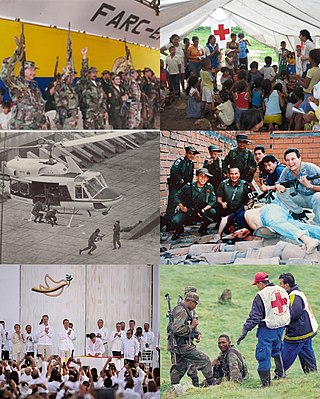
The Colombian conflict began on May 27, 1964, and is a low-intensity asymmetric war between the government of Colombia, far-right paramilitary groups and crime syndicates, and far-left guerrilla groups, fighting each other to increase their influence in Colombian territory. Some of the most important international contributors to the Colombian conflict include multinational corporations, the United States, Cuba, and the drug trafficking industry.
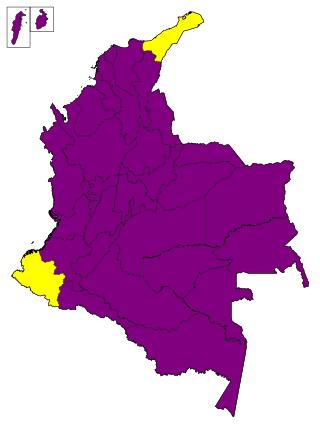
Presidential elections were held in Colombia on 28 May 2006. Álvaro Uribe was re-elected as President for another four-year term, starting on 7 August 2006. Uribe obtained 62.35% of the vote, surpassing the 50% needed to avoid a runoff against the second-placed candidate.
Right-wing paramilitary groups in Colombia are paramilitary groups acting in opposition to revolutionary Marxist–Leninist guerrilla forces and their allies among the civilian population. These right-wing paramilitary groups control a large majority of the illegal drug trade of cocaine and other substances. The Colombian National Centre for Historical Memory has estimated that between 1981 and 2012 paramilitary groups have caused 38.4% of the civilian deaths, while the Guerillas are responsible for 16.8%, 10.1% by the Colombian Security Forces and 27.7% by non-identified armed groups, although the chief prosecutor of the ICC would contradict these numbers.

This article covers national and international security issues in Colombia.
The Democratic Colombia Party was a political party in Colombia founded in 2003. After 2006, the small party was decimated by the parapolitics scandal, in which four of its five congressmen were forced to resign and several found guilty.
Rodrigo Tovar Pupo, was born in Valledupar, Colombia. He was the leader of the Northern Bloc of the United Self-Defense Forces of Colombia. He demobilized with his two thousand men strong group on March 10, 2006 in La Mesa, Department of Cesar.

Salvatore Mancuso Gómez, also known as "el Mono Mancuso", "Santander Lozada" or "Triple Cero", among other names is a Colombian paramilitary leader, once second in command of the United Self-Defense Forces of Colombia (AUC) paramilitary group. The paramilitary groups commanded by Mancuso fought the guerrillas, and financed their activities by receiving donations from land owners, drug trafficking, extortions and robbery.

The Colombian parapolitics scandal or "parapolítica" in Spanish refers to the 2006–present Colombian congressional scandal in which several congressmen and other politicians have been indicted for colluding with the United Self-Defense Forces of Colombia (AUC), a paramilitary group which is responsible for killing thousands of Colombian civilians.
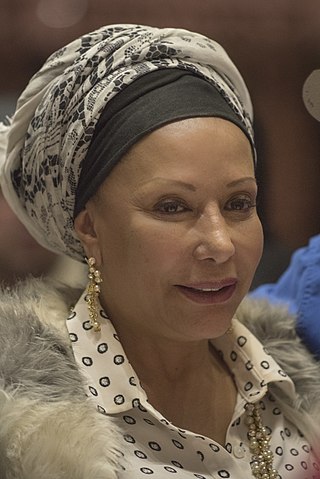
Piedad Esneda Córdoba Ruiz was a Colombian lawyer and politician who served as a senator from 1994 to 2010. A Liberal Party politician, she also served as a member of the Chamber of Representatives of Colombia for Antioquia from 1992 to 1994.
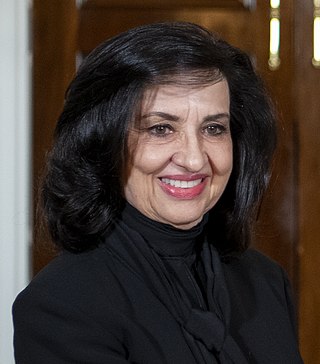
Claudia Blum Capurro is a Colombian psychologist and politician who served as foreign minister. A veteran Senator, she became the first woman to serve as President of the Senate of Colombia. She also served as the 26th Permanent Representative of Colombia to the United Nations.
Carlos Mario Jiménez Naranjo aka "Macaco" is a Colombian former drug lord and paramilitary leader. Jimenez was a member of the United Self-Defense Forces of Colombia (AUC) paramilitary group which demobilized between 2005 and 2007. Jimenez ordered the assassination of numerous people in the region of the Santander and North Santander specially in the city of Barrancabermeja where his organization confronted and defeated the National Liberation Army (ELN) for the control of the territory. Jimenez was the commander in chief of the Central Bolívar Bloc of the AUC.
Jorge Aurelio Noguera Cotes is a Colombian lawyer, former Director of the Administrative Department of Security (DAS), the intelligence service agency of Colombia and a polemical convicted murderer who served during the direct orders of the president Álvaro Uribe Vélez. A Liberal party politician, he served as regional campaign manager in the Department of Magdalena for then-candidate Álvaro Uribe Vélez during the 2002 presidential elections. After Uribe's victory in the elections, Noguera was appointed Director of the DAS, serving from 2002 to 2005, after which time he was appointed Consul-General if Colombia in Milan in 2006.
Colombia has been in the throes of civil unrest for over half a century. Between 1964 and now, 3 million persons have been displaced and about 220,000 have died, 4 out of 5 deaths were non-combatant civilians. Between left and right-winged armed forces, paramilitary and/or guerrilla, and an often corrupt government, it has been difficult for Colombia to set up any kind of truth or reconciliation commission. That is why the first on the scene, so to speak, were representatives of the UN. The Office of the United Nations High Commissioner for Human Rights has been present in Colombia since 1997. Since 2006 though, there has been another international movement turning its attention to Colombia; namely the International Center for Transitional Justice (ICTJ). The works of both of these institutions have led to a few semi-official national committees to oversee truth seeking missions in the hopes of eventually achieving reparation. In 2012, the Colombian government and the Revolutionary Armed Forces of Colombia (FARC) began their fourth attempt to negotiate an end to the fighting. Peace talks between the Colombian government of Juan Manuel Santos and the FARC, the main guerrilla force in the country, are currently underway in Havana, Cuba. The main issues are land redistribution, integration of the FARC into the political arena and an end to the powerful cocaine cartels. Though past attempts at peace talks have failed, negotiators in Havana, Cuba have gotten significantly further than ever before. Experts agree that it is not unreasonable to expect an accord by the end of 2014. In the words of President Santos: "Only in a Colombia without fear and with truth can we begin to turn the page."
The Colombian peace process is the peace process between the Colombian government of President Juan Manuel Santos and the Revolutionary Armed Forces of Colombia (FARC–EP) to bring an end to the Colombian conflict, which eventually led to the Peace Agreements between the Colombian Government of Juan Manuel Santos and FARC-EP. Negotiations began in September 2012, and mainly took place in Havana, Cuba. Negotiators announced a final agreement to end the conflict and build a lasting peace on August 24, 2016. However, a referendum to ratify the deal on October 2, 2016 was unsuccessful after 50.2% of voters voted against the agreement with 49.8% voting in favor. Afterward, the Colombian government and the FARC signed a revised peace deal on November 24 and sent it to Congress for ratification instead of conducting a second referendum. Both houses of Congress ratified the revised peace agreement on November 29–30, 2016, thus marking an end to the conflict.
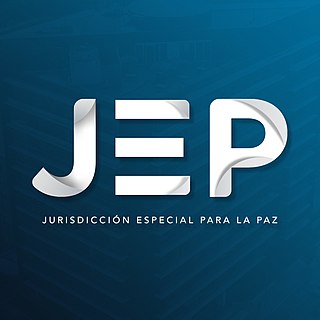
The Special Jurisdiction for Peace, also known as Special Justice for Peace, is the Colombian transitional justice mechanism through which FARC members, members of the Public Force and third parties who have participated in the Colombian armed conflict are investigated and put on trial.

Álvaro Uribe's term as the 31st president of Colombia began with his first inauguration on August 7, 2002 and ended on August 7, 2010. Uribe, candidate of the Colombia First party of Antioquia, took office after a decisive victory about the Liberal candidate Horacio Serpa in the 2002 presidential election. Four years later, in the 2006 presidential election, he defeated the Democratic Pole candidate, Carlos Gaviria, to win re-election. Uribe is the first president not to represent either of the two traditional parties, Liberal and Conservative.